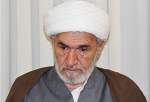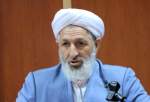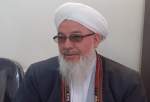Iran’s President Seyyed Ebrahim Raeisi censured the recent killing of Al Jazeera correspondent by Israeli forces in Jenin and stressed that crimes by Tel Aviv troops only bring more hatred of the regime.
14 Apr 2025
- Thousands rally in Milan demanding end to Israeli genocide in Gaza
- Israel destroys Baptist hospital in Gaza, forcing it out of service
- Hamas delegation heads to Cairo for talks with Egyptian, Qatari mediators on Gaza ceasefire
- UNRWA: Infants in Gaza going to bed hungry due to severe shortages of essential supplies
- Iranian rights group slams Israeli efforts for Judaization of al-Aqsa Mosque
- Emad al-Doleh Mosque in Kermanshah, Iran (photo)
- Red Cross/Red Crescent head calls for end to attacks on humanitarian workers
- Rafah municipality slams annexation of southern Gaza city to Israeli security zone
- Pakistan calls for OIC emergency meeting on Israeli crimes in Gaza
- Israeli strike destroys emergency ward in al-Ahli Hospital












